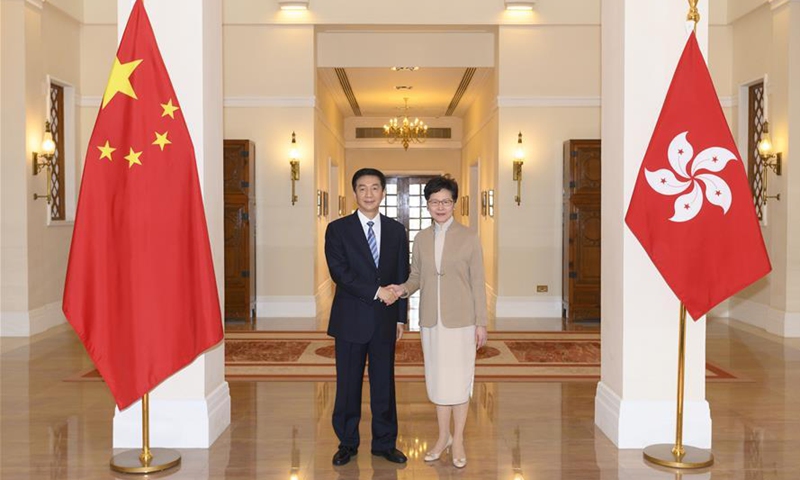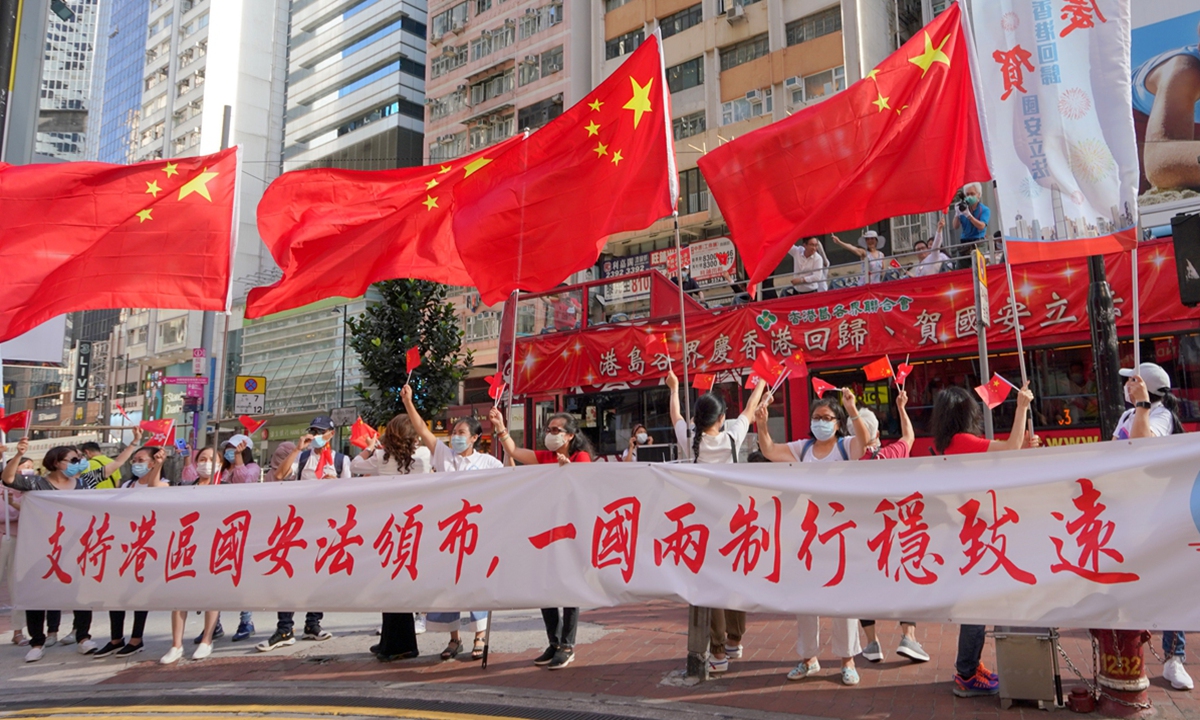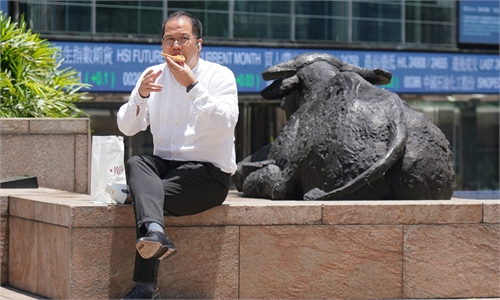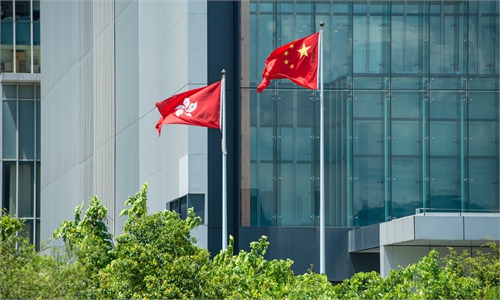Officials condemn US sanctions on HK
Washington's unilateral action of symbolism won't bite: experts

Chief Executive of China's Hong Kong Special Administrative Region (HKSAR) Carrie Lam meets with Luo Huining, the new director of the Liaison Office of the Central People's Government in the HKSAR in south China's Hong Kong, Jan. 9, 2020. Photo:Xinhua
In an unprecedented way, Hong Kong officials who had recently been sanctioned by the US government came out with unusually tough rhetoric to criticize this action, which has been described as "shameless and despicable."
However, some experts are now looking at the worst case scenario stemming from the sanctions as well as the chilling effect they may cause on a broader scale. Chinese policymakers are believed to have been well prepared to minimize the impact.
As the US Department of the Treasury announced sanctions against 11 individuals for "undermining Hong Kong's autonomy and restricting the freedom of expression or assembly of the citizens of Hong Kong" on Friday, those targeted include some prominent local officials such as Carrie Lam, chief executive of the Hong Kong Special Administrative Region (HKSAR) government, Chris Tang, Commissioner of Hong Kong Police Force, John Lee, Secretary for Security, and also officials from the Chinese central government's administrations in charge of Hong Kong affairs.
The latest US action is widely seen as "symbolic" rather than "substantive" as some officials such as Lam and Luo Huining, director of the central government's liaison office in Hong Kong, dismissed the risk of the sanctions by openly saying that they have no assets in the US, given the US authorities can now seize any property and interests of those officials in the US and prohibit transactions with US parties under the sanctions.
To fight back
As a veteran Communist Party of China (CPC) official who has been praised as "politically mature," Luo hit back at US sanctions on Saturday in a satirical manner by suggesting that he could send $100 to US President Donald Trump to be frozen.
Lam also ridiculed the US action in an earlier interview in July by saying that "when faced with the so-called US sanctions against me, I would just laugh it off and give it a snort of contempt." In response to the new sanctions, she said in a Facebook post on Saturday that her US visitor visa is due to expire in 2026, and since she doesn't yearn for the US, it seems like she can take the initiative to cancel her visa.
"Amid heightened China-US tensions, it's more like playing mind games. Such a sense of humor, distinct from stereotyped images of some CPC officials, is delivering a clear message that the sanctions won't frighten Chinese policymakers," Lawrence Tang Fei, a member of the Chinese Association of Hong Kong and Macao Studies, told the Global Times on Friday.
In a more straightforward manner, Financial Secretary Paul Chan and Chief Secretary for Administration Matthew Cheung, both showed their "fearless spirits" on Sunday by harshly slamming the US' unilateral stance, calling it outrageous and unjustified. Cheung also noted that the sanctions violate the basic norms of international law and international relations, and the US Department of the Treasury deliberately disclosing personal data of government officials seriously infringes on privacy and endangers personal safety.
Cheung also reiterated that the HKSAR government won't fear these so-called sanctions, and will fully support the central government in taking countermeasures.
Chan, who is widely considered to be a mild-tempered local official, criticized the US for exposing its self-righteous, hegemonic ideology by blatantly intimidating others, according to a blog post seen on Sunday.
Though it's rare to see local officials reacting to US suppression in such a proactive manner, some experts considered their latest remarks as "proportionally reasonable" responses to the US sanctions, particularly when it comes to the fundamental interests of the country and the bottom lines of the Chinese government concerning sovereignty and national security.
"The sanctions won't shake their resolve. It will only help Chinese officials to further drop their illusions about the US government and prepare fully for worst case scenarios," Tang said.

Hong Kong citizens on Tuesday gather to support the National Security Law for Hong Kong. Photo: cnsphoto
How big is the impact?
Given the latest sanctions allow US authorities to freeze officials' assets and prohibit US firms from doing businesses with them, some experts are raising questions over how big the impact will be, whether US-linked businesses would be caught in the crosshairs and need to reassess their business ties with those sanctioned individuals. More importantly, whether such a retaliatory move over the national security law for Hong Kong would have a wider scope, including family members of these officials, becomes another point of attention.
Also, some local lawmakers and experts indicated that though banks are still reviewing the potential impacts on the concerned individuals, local banks may want to avoid US-related transactions like US dollar-denominated transactions with those people on the sanctions list, though the local monetary authority said on Sunday that the US' unilateral sanctions have no legal status in the city.
"The most worrisome issue is the chilling effect that the sanctions would have. Although the US government imposed sanctions on those officials on a relatively small scope, questions remain unanswered whether business and technology firms would take further action to avoid risks or getting into trouble," Tang said.
Besides banking services, the use of social network platforms owned by the American companies like Facebook or Twitter may pose another problem. For example, Facebook said on Saturday that it had "taken steps to prevent the use of payment services" for individuals on the list, the New York Times reported.
"Whether those officials on the list would be banned on Facebook or not be able to use the SWIFT system to do foreign exchange transactions, we don't know yet," Kennedy Wong Ying-ho, solicitor of the Supreme Court of Hong Kong, told the Global Times on Sunday, "We still need more time to see the actual impact."
Tam Yiu-chung, a member of the Standing Committee of the 13th National People's Congress (NPC) - the country's top legislature - told the Global Times that the impact on those individuals would be minimal. "But we don't know the impact on their family members yet."
Lam Yeuk-hei, the younger son of Lam, who was studying at Harvard University, has returned to Hong Kong ahead of the issuing of the sanctions, media reported on Sunday. "Also, the husband of Teresa Cheng [HKSAR Secretary for Justice], who is doing business with the US, may also be affected," Tang said.
Finding substitutes for American products and services could also be a potential solution in facing a harsh crackdown, some experts suggested. For instance, Chinese policymakers could be advised to form a special task group to help minimize the actual impact of sanctions.
Even if US-based banks in Hong Kong, such as Citibank, the American Bank, and JPMorgan, place restrictions on those officials, there would be little effect, Liang Haiming, chairman of the China Silk Road iValley Research Institute, told the Global Times on Sunday.
One approach to confront those sanctions is to substitute US dollar-denominated transactions with the use of renminbi, as part of collective efforts to accelerate the internationalization of the Chinese currency, Liang noted.
"Or other currency-denominated transactions could also be encouraged to avoid sanctions, including the use of the British pound or the euro," he said.



